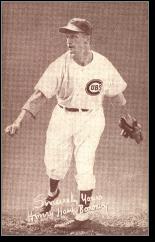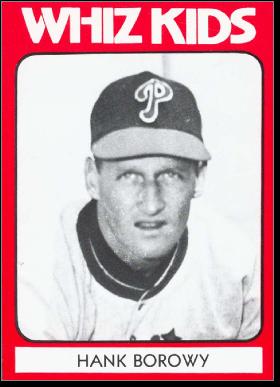
Hank Borowy
Sport: Baseball
Born: May 12, 1916
Died: August 23, 2004
Town: Bloomfield, New Jersey
Henry Ludwig Borowy, was born on May 12, 1916, in Bloomfield. He was a skinny right-hander who whipped the ball in with tremendous movement and control. In an extra-inning game for Bloomfield High in 1935, Hank fanned 27 batters. That summer, Hank traveled briefly with the Newark Bears, the top farm team of the Yankees. But manager Bob Shawkey decided not to sign him. Hank decided to go to college instead.
While at Fordham University, Hank came under the tutelage of coach Jack Coffey. He put the finishing touches on Hank’s mound repertoire. He won 23 of 24 decisions for the Rams and hurled a no-hitter against Rutgers. Hank played the outfield when he wasn’t pitching. And when he wasn’t in school, he pitched semipro ball for a Brooklyn club under the name of Gene Brown so as not to lose his college eligibility.
After graduation, Hank signed with the Yankees. He played in the minors from 1939 to 1941. In 1941, he and Johnny Lindell combined for 40 wins as Newark won the International League pennant. He made the club out of spring training, pitched five no-hit innings against the Red Sox in his major-league debut, and won 10 of 11 decisions as a rookie.
That September, Hank thought he had no-hit the St. Louis Browns only to find that a ball mishandled by Joe Gordon in the opening frame had been scored a hit instead of an error. The Yankee Stadium scoreboard at the time did not post hits and errors until the end of the game. As Hank’s teammates rushed to congratulate him, a big 1 slid into the space for hits. The Yankees won the pennant but lost the 1942 World Series to the Cardinals. Hank started Game 4 and was knocked out of the box. Hank stayed in the big leagues during the war years because he also worked as a supervisor in a Bloomfield defense plant. He also participated in USO tours.
The Yankees repeated as AL champs in 1943 and Hank avenged his loss to the Cardinals in the World Series, beating them in Game 3. Hank pitched the game in front of the largest crowd in World Series history at the time. His brother, Bill, on leave from the Navy, was one of the nearly 70,000 fans in the stands.
In 1944, Hank was the starting pitcher for the American League in the All-Star Game. He pitched three shutout innings and drove in the only run in a 7–1 loss. He finished the year 17–12, but the Yankees fell short of the pennant. In 1945, Hank pitched well for the Yankees despite a sore arm. His record stood at 10–5 when the team inexplicably sold him to the Chicago Cubs. He went right on winning in the Windy City, going 11–2 to finish with 21 wins— the first time since 1902 a pitcher had won 20 splitting the year between the two leagues. Hank pitched enough innings to be crowned the NL’s ERA leader, with a 2.13 mark. The Sporting News chose Hank as the league’s Pitcher of the Year. the first time since 1902 a pitcher had won 20 splitting the year between the two leagues. Hank pitched enough innings to be crowned the NL’s ERA leader, with a 2.13 mark. The Sporting News chose Hank as the league’s Pitcher of the Year.
The Yankees fell short of the pennant again, but the Cubs finished in first place thanks to their amazing mid-season pickup. Hank was selected to pitch the World Series opener against the Tigers, a team he had owned in the American League. True to form, he pitched a shutout to give the Cubs an early leg up. Detroit tied the series at 2–2 and Hank took the mound again in Game 5. He lost 8–4, but returned in Game 6 to pitch four solid relief innings in an 8–7 extra-inning victory that kept Chicago’s hopes alive. Unfortunately for Wrigley fans, that was the last time a Cub pitcher won a World Series game. Hank took the mound again to start Game 7, but he had nothing left. He was pulled when the first three batters reached base. The Tigers won 9–3. And so Hank Borowy holds the distinction of being the last Cub to lose a World Series game, too.
Hank was never the same pitcher after the 1945 World Series, although he did have more heroic moments. In 1948, he faced the minimum 27 batters against the Dodgers in a 3–0 win. Only one batter reached base safely, and he was erased trying to steal second.
Hank played in the majors until 1951, going from the Cubs to the Phillies to the Pirates to the Tigers, who released him. He caught on with Buffalo of the International League in 1952, but continued to pitch inconsistently and finally called it a career—a career that truly was a tale of two pitchers. In his first four seasons, he was 67–32. He was 41–50 the rest of the way.
Hank stayed in Bloomfield after his pitching days were over and ran an insurance and real estate office in town. He retired in the 1980s with his wife Katherine to Pt. Pleasant. Hank died in 2004 at the age of 88.
|